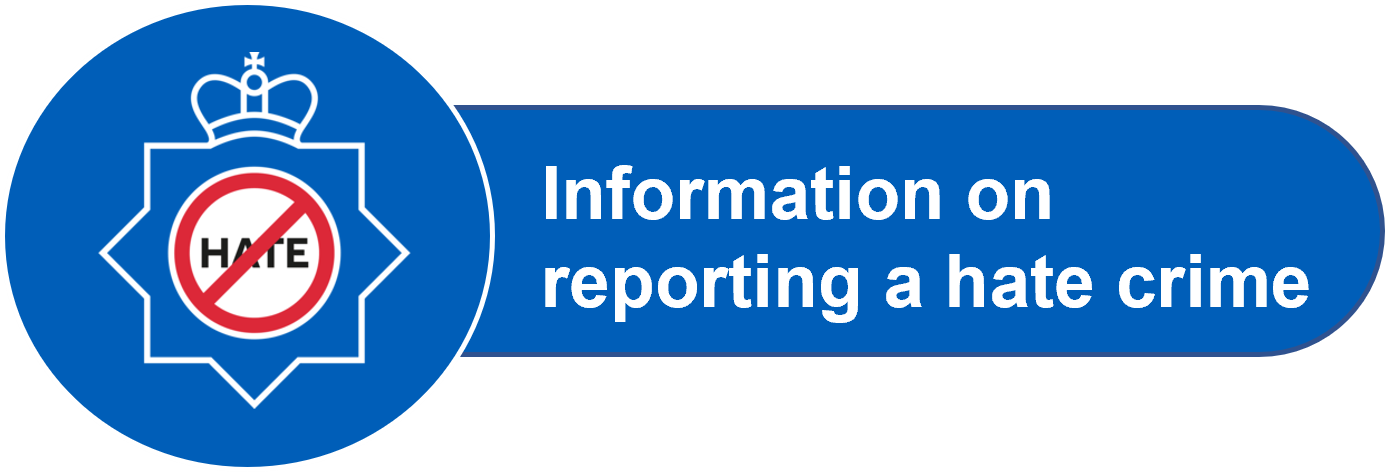What is discrimination?
Discrimination is when you are treated unfairly because of who you are, or what you believe.
You may want to talk to the People Hub or get support from a union representative if you think you have experienced discrimination.
You may want to talk to the People Hub or get support from a union representative if you think you have experienced discrimination.
Discrimination can come in one of the following forms:
Putting rules or arrangements in place that apply to everyone, but that put someone with a protected characteristic at an unfair disadvantage.
Unwanted behaviour linked to a protected characteristic that violates someone's dignity or creates an offensive environment for them.
Treating someone unfairly because they've complained about discrimination or harassment.
A crime is an act that breaks the law. Any crime has the potential to be a hate crime, especially if it involves one or more of these:
- Offensive language (including name calling and insults)
- Abusive verbal or written comments which are meant to threaten and intimidate (including through email, social networks and mobile phone messages)
- Physical assault
- Domestic violence
- Financial exploitation
- Vandalism or criminal damage to your property (including graffiti)
- Sexual abuse and assault
- Threats, intimidation, humiliation or degradation
It's important to remember that a victim does not have to be a member of the group the hostility is targeted at. In fact, anyone could be a victim of a hate crime. For example, you could be called a homophobic slur, even if you're heterosexual.
When is hate an incident?
A hate incident is any incident (which may or may not be a crime) that the victim or any other person believes is motivated by hostility or prejudice towards any aspect of the victim's identity. Hate incidents can feel like crimes to those who suffer them and often escalate to crimes or tension in a community. Hate incidents should be reported just as hate crimes are.
Why should I report a hate crime?
- You stop it from getting worse
- You stop it from happening to others
- You help identify the offenders
- You make your community safer
Anybody can report a hate crime – whether they're the victim, someone who saw the crime, or someone the victim has told about the crime or incident.
If someone's life is in danger, or a serious crime is taking place, you should always call the police immediately using 999.
In all other cases, you can contact the police on 101. And make sure you say that you believe it's a hate crime.
If you or the victim don't want to talk to the police:
You can report with your contact details on report and support or you can contact Security Team for support
How do I know if it's a hate crime or hate incident?
Some examples of hate incidents include:
- verbal abuse like name-calling and offensive jokes
- harassment
- bullying or intimidation by children, adults, neighbours or strangers
- physical attacks such as hitting, punching, pushing, spitting
- threats of violence
- hoax calls, abusive phone or text messages, hate mail
- online abuse, for example on Facebook or Twitter
- displaying or circulating discriminatory literature or posters
- harm or damage to things such as your home, pet, or vehicle
- graffiti
- arson
- throwing rubbish into a garden
- malicious complaints, for example over parking, smells or noise
Some examples of hate incidents include:
When hate incidents become criminal offences they are known as hate crimes. A criminal offence is something that breaks the law. Some examples of hate crimes include:
- assaults
- criminal damage
- harassment
- murder
- sexual assault
- theft
- fraud
- burglary
- hate mail
- harassment
Race and Religious Hate Crime
Racist and religious crime is particularly hurtful to victims as they are being targeted solely because of their personal identity: their actual or perceived racial or ethnic origin, belief or faith. These crimes can happen randomly or be part of a campaign of continued harassment and victimisation.
Where can I get external support from?
Race and Religious hate crime
Where can I get external support from?
Race and Religious hate crime
- Citizens Advice on Racist and Religious Hate Crime. Citizens Advice provides further information on racist and religious hate crime.
- CPS Policy on Prosecuting Racist & Religious Hate crimes. The Crown Prosecuting Service sets out their policy and provides further information.
Homophobic and Transphobic Hate Crime
In the past, incidents against lesbian, gay, bisexual people or transgender people have been rarely reported and even more rarely prosecuted. Research studies suggest that victims of, or witnesses to, such incidents have very little confidence in the criminal justice system.
- Citizens Advice on Homophobic and Transphobic Hate Crime. Citizens Advice provides further information on homophobic and transphobic hate crime
- CPS policy on Prosecuting Homophobic and Transphobic Hate Crimes. The Crown Prosecuting Service sets out their policy and provides further information.
Disability Hate Crime
Feeling and being unsafe through violence, harassment or negative stereotyping has a significant impact on disabled people's sense of security and wellbeing. It also impacts significantly on their ability to participate both socially and economically in their communities.
- Citizens Advice on Disability Hate Crime. Citizens Advice provides further information on disability related hate crime.
- CPS policy on prosecuting Disability Hate Crimes. The Crown Prosecuting Service sets out their policy and provides further information.
Find out more
- True Vision offers guidance on reporting hate crime and hate incidents. If you do not wish to talk to anyone in person about the incident or wish to remain anonymous there is an online form for reporting hate crime; you can report non-crime hate incidents to the police to try and prevent any escalation in seriousness.
- Internet Hate Crime. True Vision also provide further information on internet hate crime.





